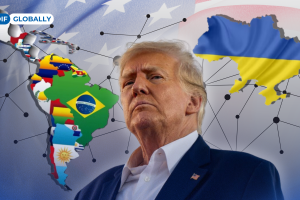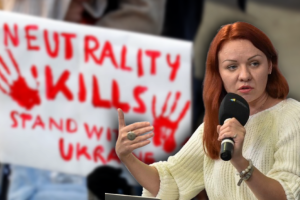How to improve media coverage of Russian invasion — suggestions from Ukrainian analysts
Source: NV
While international media has been highlighting developments in Ukraine, Ukrainian journalists and experts have some notable suggestions and recommendations on how this coverage can be improved, making it more relevant and well-rounded.
Please, do not consider this material as telling you how to do your jobs, but rather as a guide on making cooperation with Ukrainian media more fruitful.
1) Use humanitarian arguments not only to highlight the scope of hostilities, but also to assess the measures and instruments taken to stop them
One simple example is coverage of the idea of a "no fly zone" for Ukraine. The key argument against closing the skies over Ukraine is the military one.
Yes, the West is trying to avoid a direct, as NATO officials say, military confrontation with Russia. However, "no fly zones" are just often used as a way a of providing humanitarian aid, to stop crimes against humanity and war crimes, and as an instrument to stop the mass killings of civilians.
Moreover, it can be a deterrent to a man-made disaster. Let's not forget that Russia has already seized the Chernobyl nuclear reactor, shelled a radioactive waste storage facility in Kyiv, and is trying to occupy Europe's biggest nuclear power plant, Enerhodar.
These are at least two questions to pose to experts and, most importantly, politicians, in your foreign studios and during interviews: how to stop or reduce the scale of these crimes? What is the alternative to a “no-fly zone”?
2) When covering military events, emphasize the courage and resilience of both the Ukrainian military and ordinary citizens.
Show and write how about how Ukrainians have been able to successfully self-organize during this war, how unarmed civilians are defending their settlements and are preventing Russian tanks from entering their villages and towns. The vast majority of the media is looking for a "human dimension" in current events. Show the world that the Ukrainian army is absolutely capable of defeating Russia, not least thanks to its indefatigable spirit. They only have to be supported with weapons, ammunition, and a closed sky.
Similarly, write about the organization of Ukrainian civil society. This is what makes Ukraine radically different from Russians - Ukraine's vibrant civil society has been the impetus of many of the reforms Ukraine has undergone, and has been the driver of Ukraine's turn towards liberal and European values, unlike Russia, where independent civil society has been all but stamped out.
3) Stop hunting for only personal stories!
This war is a tragedy of a European scale. Highlight that factor, use numbers, show the overall scope rather than concentrating on the story of a single family. Those stories will come later.
Stop asking people, especially journalists and public Ukrainian experts, to tell you where they are! Do not ask them to tell you where their relatives are - it can be dangerous. If a person wants, they will tell you where they are. Don't insist that we send you photos "before" the war and "after" with our families - it looks thoughtless under the current circumstances. We are not the heroes of a cheap soap opera.
Don't be upset if the person, whose contact you were given, is not hiding in shelter or has moved to a safer place! That can seem disrespectful, and showcases a lack of understanding for the experiences Ukrainians are living through, your lack of care for the situation, and diminishes the work of our analysts and journalists. Their expertise does not lose value just because they moved to a safer place.
4) Appreciate the time and effort of those Ukrainians who work with you on covering the Russian invasion
Do not cancel the interview half an hour before it starts. Don't ask 1001 questions if you've agreed on a 15 minute interview. If you have agreed to an on air interview and the broadcast plan has changed, record the interview /comment instead of just canceling it at all. Key Ukrainian experts now have a myriad of journalists and media reaching out, and if you neglect our time, we simply lose the opportunity to say our piece through someone else at the same time.
For those who are actively working from the hottest spots in Ukraine - pay honorariums. The big media outlets will not be impoverished by this, but analysts/journalists from Kyiv/Odesa/Kharkiv and other cities will not feel like free labor for those media and TV channels they're providing their data, expertise, and time.
Yes, we all want the world to know about our war.
But believe me, a change in the attitude towards our journalists and analysts would be very significant emotional support for them.
5) Do not "compare" official Ukrainian data with Russian sources
Yes, today the "menu" is very limited: international organizations aren't working on the ground. There's lots of unconfirmed information. But addressing and, moreover, referencing the Russian "point of view" is neither balance, nor keeping journalistic standards, but instead free aid to Russian propaganda and lies.
This list of recommendations is not a manual or an attempt to teach media how to cover Ukraine. Just think of it as some thoughts from a person on the other side of the camera, as a point of view that at least is worth taking into account for the common goal of providing a fuller range of coverage of the current situation.









